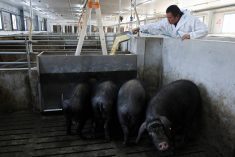Sao Paulo | Reuters — Brazil’s beef exports to China will be halted starting Thursday after a case of bovine spongiform encephalopathy (BSE) was confirmed in the northern state of Para, the country’s agriculture and livestock ministry said on Wednesday.
The suspension is part of an animal health pact previously agreed between China and Brazil and is expected to be temporary. It is a blow to Brazilian farmers, as China is the main destination for Brazil’s beef exports.
“All measures are being taken immediately at each stage of the investigation and the matter is being handled with total transparency to guarantee Brazilian and global consumers the recognized quality of our meat,” said Minister Carlos Favaro.
Read Also

Former U.S. agriculture officials, top Republican senator warn of farm country trouble
The chair of the U.S. Senate’s agriculture committee warned on Tuesday that farmers were suffering heavy losses, while more than two dozen former industry leaders sounded the alarm about the risk of a “widespread collapse of American agriculture” ahead of a $12 billion government bailout expected to reach growers this month.
A case of BSE was confirmed earlier by Para’s agricultural defense agency.
“The symptomatology indicates that it is the atypical form of the disease, which appears spontaneously in nature, causing no risk of dissemination to the herd and to humans,” the agency said in a statement.
The sick animal was on a property with 160 head of cattle in the southeast of the state. The site has been inspected and preventively interdicted, the agency added.
Samples were sent to the World Organization for Animal Health’s (OIE) Canadian reference lab in Lethbridge to confirm whether it was the “classic” form of the disease or its “atypical” version.
“Classic” BSE, which occurs in cattle when an animal eats feed contaminated with the misfolded protein that causes the disease, has been linked to variant Creutzfeldt-Jakob disease in people. The “atypical” form is considered to be of lower risk to people as it occurs naturally and only sporadically in older cattle.
In 2021, two cases of BSE triggered a suspension in beef exports to China that lasted more than three months.
— Reporting for Reuters by Peter Frontini.















